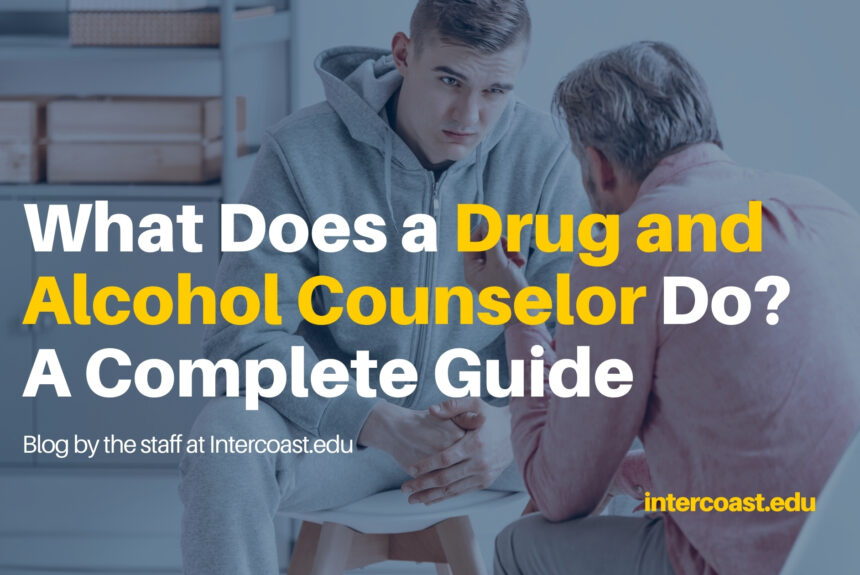Estimated reading time: 5 minutes
Table of contents
Drug and alcohol addiction is a pervasive problem in the United States. According to a recent national survey, nearly 20% of teens and adults struggle with a substance abuse disorder. Alcohol is the leading source of addiction (74%), while illicit drugs account for 38% of reported instances of addiction.
Many of those people can successfully end their addictions by working with a trained drug and alcohol counselor.
Are you interested in learning how to become a drug and alcohol counselor? Or are you simply curious about the field? Read on to learn more about how substance abuse counseling works.
What Does a Drug and Alcohol Counselor Do?
Due to the unique cases that a rehab counselor may see, every day is different in this career field. This career requires flexibility and dedication. Each new client comes with complex challenges.
An addiction counselor provides substance abuse help through support and counseling, working with various allied health professionals in treatment.
Support
Addressing addiction requires a network of support services. An addiction counselor is often the initial point of contact for clients.
An addiction counselor may connect someone with an addiction to alcohol to community services like Alcoholics Anonymous.
The counselors are often tasked with following up with clients. They also ensure that clients attend those meetings regularly so that they are getting the support they need.
Support can come from many places. An addiction counselor may ask a client about family relationships or what church or place of worship they attend. These treatments are most effective when the person going through treatment has a healthy support network.
Counseling
Direct counseling or therapy sessions are where the real transition from addiction happens. There are many options. Each works to help individuals develop the tools to fight addiction and avoid situations that may trigger a relapse.
Therapy sessions can take place through individual, group, or family sessions. Cognitive Behavioral Therapy (CBT) trains clients to observe negative or harmful thoughts. They then learn to phase out those thoughts gradually. The goal is to change behaviors by changing the way a client thinks. The process involves training clients to understand what triggers relapse into addiction. Therapists can combine CBT with other therapy techniques. These are very helpful techniques. A licensed psychologist or psychiatrist conducts these therapy sessions, and not by an alcohol and drug counselor. These are very effective and are often combined with other treatment plans.
Motivational interviewing helps to break clients out of their ambivalence toward treatment. The treatment does this by focusing on the benefits of completing addiction counseling. Rather than being a top-down approach, motivational interviewing meets clients halfway. The person who struggles with addiction is often involved in mapping out paths to success.
Treatment
Counseling is just one form of treatment. Severe cases of addiction may require commitments at rehab centers or medications, and those suffering from addiction are also monitored by a healthcare support group of doctors, therapists, psychologists, and addiction counselors.
One of the first medical interventions is detoxification. There are many ways to remove addictive substances from the body, and those treatments must be handled carefully. The abrupt cessation of certain types of drug use can be life-threatening.
Detox aims to reduce the symptoms of withdrawal as much as possible. These treatments are handled under the supervision of trained specialists.
Several medications are known to aid in addressing addiction. An addiction counselor is not certified to prescribe medications, but they assist licensed medical professionals where permitted by their scope of practice.
How Do I Become a Substance Abuse Counselor?
Most states require addiction counselors to have a college degree. If you are pursuing a career in addiction counseling, consider majors and courses to aid your career. Courses in addiction studies, biology, medicine, and psychology are great places to start.
Courses related to the field of addiction counseling will also help you prepare for your counselor certification exams.
There are some colleges that offer degrees in addiction counseling. A growing number of those programs are offered entirely online. Depending on the program you choose, you can earn a certificate, associate’s, or bachelor’s in the field of addiction counseling. You may choose to pursue related fields and then follow the path to certification, depending on the state in which you plan to work. It is good to research your options, so you know your path before starting.
Once you graduate, most states require candidates to acquire real-world experience in the field, such as a clinical internship plus additional work experience hours. Check with your state certification boards to see what those requirements are.
Once you have completed those steps, you will need to pass a test written and administered by the state or certifying body in the state you wish to work.
InterCoast Colleges
InterCoast Colleges can help you start your career in the field of addiction counseling.
Our fully online Alcohol And Drug Counseling Training Program offers a convenient blend of on-campus and virtual courses. The classes give you real-world practice under the guidance of experienced faculty.
Our students will learn about critical skills like:
- Personal and Group Counseling
- Relapse prevention
- Law and Ethics
- Physiology
- Pharmacology
- Skills development to enhance professional growth
Students complete online assignments throughout the week from the convenience of their homes and will be required to complete a clinical internship at the end of the program. The entire certificate program can be completed in 12-16 months.
This career field is expected to grow over the next decade.
Learn About Addiction Counseling at InterCoast
A career as a drug and alcohol counselor can be incredibly rewarding. Every day, addiction counselors give teens and adults the skills needed to live a healthy and rewarding life free from addiction.
Our program is approved by the California Consortium of Addiction Programs and Professionals (CCAPP). To learn more about our convenient and comprehensive programs, apply online today!

